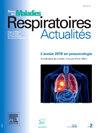Mésothéliome pleural : algorithme thérapeutique
Q4 Medicine
引用次数: 0
Abstract
Pleural mesothelioma (PM) is a quite rare tumor, usually due to previous asbestos exposure. Its global prognosis is poor, without validated curative treatment to date. Diagnosis relies ideally on thoracoscopy with pleural biopsies, ± combined with (immediate) talc pleurodesis. Surgery with curative intent, included with multimodal treatment and restrained to highly selected patients, was recently rechallenged. As frontline treatment, standard pemetrexed/platinum-based chemotherapy was lightly improved by addition of bevacizumab. It is currently challenged by the immunotherapy combination of Nivolumab + Ipilimumab, and perhaps soon by combinations of chemotherapy + immunotherapy. No standard treatment is firmly validated beyond first line treatment, even if anti-PD-1/PD-L1 ± anti-CTLA-4 checkpoint inhibitors also exhibited some interesting results in this setting, in phase II and III clinical trials. Therefore, the search of new treatments, strategies and biomarkers is a crucial goal, and recruitment of patients in clinical trials strongly encouraged. Other immunotherapies alone or combined with standard treatments and/or targeted therapies, multimodal strategies are currently assessed. In France, the national network of expert centers for PM management, “NETMESO” (labelled by INCa), aims at proposing an optimal management to all patients systematically discussed in regional (± national) MTB dedicated to PM, and at stimulating clinical and translational research in collaboration with its partners including patients advocating associations.
胸膜间皮瘤的治疗算法
胸膜间皮瘤(PM)是一种非常罕见的肿瘤,通常是由于先前接触石棉所致。它的总体预后很差,迄今尚无有效的治疗方法。理想的诊断依赖于胸腔镜胸膜活检,±结合(立即)滑石粉胸膜切除术。以治疗为目的的手术,包括多模式治疗,并限制在高度选定的患者中,最近受到了重新挑战。作为一线治疗,标准培美曲塞/铂基化疗通过添加贝伐单抗得到轻微改善。目前,Nivolumab + Ipilimumab的免疫治疗组合正在挑战它,也许很快就会出现化疗+免疫治疗的组合。即使在II期和III期临床试验中,抗pd -1/PD-L1±抗ctla -4检查点抑制剂也显示出一些有趣的结果,也没有标准治疗在一线治疗之外得到坚定的验证。因此,寻找新的治疗方法、策略和生物标志物是一个至关重要的目标,强烈鼓励招募临床试验患者。目前正在评估其他单独免疫疗法或与标准治疗和/或靶向治疗联合使用的多模式策略。在法国,PM管理专家中心的国家网络“NETMESO”(由INCa标记)旨在为区域(±国家)MTB专用PM系统讨论的所有患者提出最佳管理方案,并与包括患者倡导协会在内的合作伙伴合作促进临床和转化研究。
本文章由计算机程序翻译,如有差异,请以英文原文为准。
求助全文
约1分钟内获得全文
求助全文
来源期刊

Revue des Maladies Respiratoires Actualites
Medicine-Pulmonary and Respiratory Medicine
CiteScore
0.10
自引率
0.00%
发文量
671
 求助内容:
求助内容: 应助结果提醒方式:
应助结果提醒方式:


